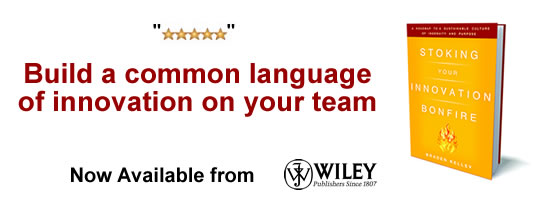Building Differentiating Capabilities for Innovation
 We so often get caught up in the building of our capabilities. In some ways, I keep attempting to “peel the innovation onion†in explaining the need to focus on building the capabilities in different ways but to be honest, it needs these various approaches to an ever-changing environment.
We so often get caught up in the building of our capabilities. In some ways, I keep attempting to “peel the innovation onion†in explaining the need to focus on building the capabilities in different ways but to be honest, it needs these various approaches to an ever-changing environment.
A different intensity of innovation onion perhaps? Why, well we have the business of today, the emerging business of tomorrow and the future business that will provide a radically different set of capacity building needs?
The struggle to date is that innovation remains hard to manage well; we strive to systematize it and then attempt to replicate any success we then have, so as to achieve more, yet more often than not. we do not take into account all the variables that came together for that particular winning outcome. Often this does not work on a repetitive basis as the variables that makeup innovation can be different for each innovation event or activity but we can learn under a growing ‘range of’ differentiating capabilities.
I would argue there is the real, urgent need is to make the innovation capabilities and capacities as distinctive and unique as the circumstances ‘we’ are facing today and in the future but also highly adaptive and flexible, so you can be ready to call upon each of the components when needed, in new combinations that deliver on the result.
We spend far too much time copying others and not deliberately setting about building our own ‘distinct’ capabilities and capacities to innovate, building the necessary building blocks through our own learning experiences. These are always shaped by the context and content of your innovation, the organization’s position, its resources, commitment and leadership appetite for innovation. Each of our choices takes up on our own evolutionary paths, we can never truly understand other ones because we never really “walk in someone else’s shoes†Copying only renders us the same, not a great ‘winning position in highly competitive market conditions, is it?
Can we find you a unique set of critical innovation capabilities?
I believe we can as I outlined here on discussing dynamic capabilities. Here I am exploring solutions along with an evolutionary path, that search for the unique innovation dynamics that are needed so you will arrive at the distinct and adaptive ones to what the CEO and board want to achieve out their strategic goals from its innovation investments. You take a fairly structured approach. It is knowing the capabilities that matter most to their particular innovation strategy and the present organization’s innovation fitness to lay out the pathway to learning how to improve, focus and execute these distinct capabilities needed in a highly focused manner and move progressively towards them.
I often break my explanations down on this building core competency into eight parts.
We have two levels to it. The first (or higher level) is the need for a 1) Unifying framework, 2) to gain alignment and this needs two essential aspects to be well-clarified. We need to establish 3) a working blueprint and a clear understanding of 4) the business focus orientation for innovation to reside in.
The outcomes of this top-tier framing then we can begin to construct the underlying level of 5) well-designed competencies and capabilities that need to be pursued so we need to move the organization or the innovation activities into ones that are seeking out this constant alignment, and this needs building 6) critical enablers and behaviours, a seeking out of 7) motivators and finally, 8) the dependencies we must have to map back so as to advance our core and build our innovation competencies upon.
The innovation accelerators model – I often keep coming back to this
I have been working on arguing you can have a unique model for some time. I think the way I have it structured is it is a formula for an innovation acceleration model. I’ve outlined this solution in a previous post. I think it is worth working through, it seems to move with the times of what we need to focus upon. Building an innovation framework that has real capabilities at its heart.
I have worked on a formula SCA = II + OC + EE + MLC + RNE for this.
 Sustainable Competitive Advantage (SCA) comes from the combining effects of the following:
Sustainable Competitive Advantage (SCA) comes from the combining effects of the following:
- II Innovation Intensity– its degree of adoption, the investments made, the multiple levels of activities and the focus of the intensity given to building capabilities to innovate.
- EE Entrepreneurial Energies– this os more on how you set about, promote and generate the internal environment as entrepreneurial to enable innovation in all its different forms to take hold and be seen as a learning environment people want to get involved with as they can readily identify with.
- MLC Market Learning Competence– these give a clearer awareness of what and where to acquire from and then take the market lessons from. The key need is to orientate always towards, and generally get to the heart of, where innovation takes place- in the marketplace and with your customers, knowing their real needs and also figuring out their unmet ones also!
- OC Organizational Learning– knowing the differences in the different ways of learning by linking the different intellectual capitals and combining the complementary assets needed to make them more dynamic.
- RNE- Relationship & Networking Effects– the supporting and enhancing aspects of making greater connections, collaborations and exchanges so as to speed up the process of innovation, reduce or contain costs and enhance your understanding through these external relationships and getting closer to knowing where latent knowledge lies, to assist and share this internally for greater impact and result for all.
I would encourage you to explore it, work it around in your own situation, it can provide a powerful catalyst to get everyone working at the critical parts of the formula and it is easy to remember.
So my additional ‘peeled onion’ to add to the stock of capability building for innovation is here
We do have to adopt out capability building increasing towards the future. We need to continue to differentiate ourselves and I would offer seven ‘generic’ thoughts or broad theme clusters that you might want to build around, to build your capabilities that will make you far more ‘innovation fit’ for the future.
- Linking to a clear sense of purpose. If we are aware of the direction we can ‘open up’ the discussions about our needs to achieve this sense of purpose. A clarity of what ‘we’ have along with the gaps we need to bridge to get to this future purpose. This was my own attempt some time back to get at my own “Finding our true purposeâ€
- Translating knowledge into value. Are we allowing knowledge to be gathered, understood, applied and diffused with our organization’s in thoughtful, well-structured ways. We need to learn how to amplify the signals in why this resonates and then we need to share these. I can never get away from the Absorptive Capacity needed to have in place and to ‘allow’ this knowledge to flow across the organization.
- Achieving impact and intensity. We do have to strengthen our resolve to perform. Innovation work needs to arrive at distinct outcomes that offer impact and intensity. This conveys’ change, it challenges the existing by delivering something better.
- Building the capacity to perform. How we assess and improve needs to be ongoing. We need to articulate the values and core needs of the organization, we need to set aside learning and exploring time and we have to show the commitments to sustaining this building ethics. We need constant walkabouts for testing and learning. The future depends on it, as we are in far more in fluid and adaptive situations that the past where agility, creativity, and ingenuity are all required.
- Aligning People, Technology, and Innovation. Technology is dominating much of what we do and how and what we do it upon. We are having higher degree’s of connectivity, interactivity and sharing opportunities than in the past to be engaged in networks, ecosystems and different relationship forums than ever before. We need to harness the essential interplays this requires.
- Exploiting and Exploring. The realization that we need to operate in ‘dual minds’ and structures is at last beginning to be recognized as essential to master. We need to be constantly striving for the innovation balance: between exploring and exploiting. We need to tackle innovation in tow different thinking hats These are about learning, searching and delivering the winning value of ‘new generation activity’ by recognizing how we balance out exploitation (extending the life) and exploration (new understanding). These need separation and different approaches.
- Creating Sustaining Value. So many organizations require re-energizing, of being re-equipped for the future in different skills and behaviors. There are so many spaces to connect into and explore and this will come from the asset orchestration that you provide (structuring, building and leveraging).
We need to not just know the appropriate resources; we need to work on the skills, processes, routines, organizational structure and disciplines that enable firms to build, employ and orchestrate mostly our intangible assets relevant to satisfying customer needs and which cannot be replicated by competitors.
Assets that deliver the new innovation needed, through attracting in collaboration efforts and integrating these into your own evolving resources by turning them into being far more dynamic and evolving in nature to meet the future challenges.
Under these seven broad ‘capability building’ approaches we can build your future innovation into being ‘sustaining’. We need to distinguish ourselves from others, as we equally have to compete with them. If we do believe we have the unique potential both in our people and in the opportunities out there, then you have to be highly purposeful in your committed intent to build the capabilities, capacity, and competencies on a very consistent basis that offer that uniqueness.
If we do believe we have the unique potential both in our people and in the opportunities out there, then you have to be highly purposeful in your committed intent to build the capabilities, capacity, and competencies on a very consistent basis that offer that uniqueness.
How you set about this building I have, within this post, suggested a number of ways to ‘peel the innovation onion’ and can only state my willingness to engage with you individually in this. This is of course if you believe innovation is essential to your future, as I certainly convinced it is increasingly becoming mission-critical to master, which is my starting point always for building the capacities to innovate
Wait! Before you go…
Choose how you want the latest innovation content delivered to you:
- Daily — RSS Feed — Email — Twitter — Facebook — Linkedin Today
- Weekly — Email Newsletter — Free Magazine — Linkedin Group
 Paul Hobcraft runs Agility Innovation, an advisory business that stimulates sound innovation practice, researches topics that relate to innovation for the future, as well as aligning innovation to organizations core capabilities. Follow @paul4innovating
Paul Hobcraft runs Agility Innovation, an advisory business that stimulates sound innovation practice, researches topics that relate to innovation for the future, as well as aligning innovation to organizations core capabilities. Follow @paul4innovating
NEVER MISS ANOTHER NEWSLETTER!
LATEST BLOGS
Three things you didn’t know about credit cards
Photo by Ales Nesetril on Unsplash Many of us use credit cards regularly. From using them for everyday purchases to…
Read MoreFive CV skills of a business-minded individual
Photo by Scott Graham on Unsplash The skills listed on a CV help employers quickly understand your suitability for a…
Read More


